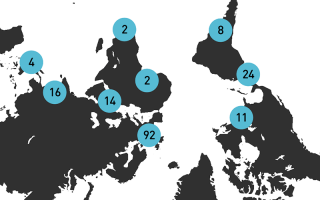I launched Holacode in November 2017. The original goal we started with, was to integrate forced migrants (returnees, deportees and refugees) in Mexico through edtech (careers in tech and financial inclusion). I began the journey alone and never thought I would own a company, let alone a tech startup (which is today 1 of the 50 fastest growing startups in Latin America according to the International Finance C). Today, the company has three new lines of services, 2 are edtech focused (b2c and b2b), the third outsourcing software (b2b) and we are preparing to launch an app to support the integration process of forced migrants in Mexico and before expanding it to the rest of Latin America.
As well as sharing the successes and unexpected turns I've had as an entrepreneur and business owner, I would like to share more about the origins of the company. After finishing my SDP masters, I became a consultant for the government of Mexico City. It was a job in which I found myself very restless slightly under-challenged, therefore I started learning how to code by myself. It was an incredibly fun and easy journey and that's where I got obsessed with breaking the myths of coding and making technology creation more accessible. I began to attend tech meet-ups where the recurring subject was "there is no talent to work in our companies". I decided to devote time to learn about the tech sector and demand for talent. I wanted to know who would be a good/ideal person to learn how to code and benefit from this experience. I began by looking into data on youth. As the SDP course taught me, a good researcher can't just look at "youth", you must break the information into segments, intersections to understand the truth in depth. This led to creating participatory workshops in different spaces – youth clubs, public high schools and other types of spaces to understand their realities. I was curious about the most marginalised experiences so I went to shelters, that's where I started meeting deportees. It started small but grew quickly, the number of returnees grew. We used the participatory workshops to map out their aspirations and the obstacles in achieving them (using many of the frameworks provided in the masters). This is how Holacode was created.
We have an admissions process that focuses on potential talent. This has proven outstanding results, to give you an example, our best backend developers come from the construction sector – we use a constructivist pedagogy to build on what they know and accelerate them in technology. We don't ask for minimum prior studies – 96% of our alumni did not complete their high school education – we focus on their potential talent. Our program runs for 5 months, throughout they receive a stipend. We mix three curriculums: software engineering ; learn2 learn (learning foundations for life) and wellness (focused on providing socio-emotional toolkits and planning skillsets). We ensure their learning process will support them for their futures and not just the immediate. Our business model is quite unique, the students pay for their education but only when they obtain a job with a tech company. We managed to design loans for people with no credit history or collateral. Results are 95% hiring success rate and 100% repayment rate. Our students earn 13x what they were previously earning, but also having salaries that puts them on the 1.7% of the population in Mexico. Breaking a huge myth: social mobility in Mexico.
The time on the SDP programme helped me build a business, one that is very profitable/successful, but more importantly, one that has the capacity to actually bring about positive social change. Holacode has been widely covered by the media from WSJ and Forbes to Japanese media, but also academic papers from the Migration Policy Institute, the Wilson Centre, the IDB and the World Bank. We have managed to make the government recognise returnees as a type of migrant and therefore access social protection as forced migrants and we're only one and a half years old. Even PBS and NPR are using the term "generation 1.5" which we've preached/coined from returned "dreamers".
The goal is to democratise the creation of technology, we started by creating a bridge of opportunities for forced migrants to radically change their livelihood options in their new country but now they're the ones making technology from their own perspectives. Our next step is to accelerate/incubate their projects, provide more accessible tech and keep expanding our reach. It's a challenging task, the tech sector is very closed and exclusive to a certain background. Occupying that space takes a lot of effort and breaking real systematic barriers, nonetheless it's what makes our work more exciting.
I am a true believer in the power of tech and education for bringing about social change. Building a company wasn't easy, I had no background on it but a lot of social sciences tools are quite useful and transferrable for business.
Marcela was a speaker at EdtechX 2019 in London on the panel The Only Way To Create the Skills of The Future is to Disrupt the Education of Today
 Close
Close


